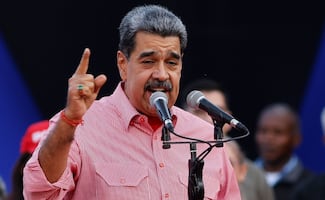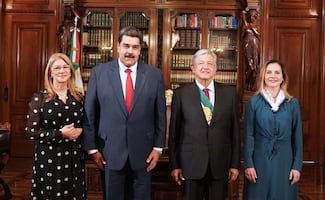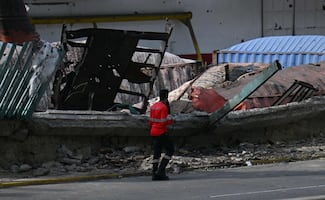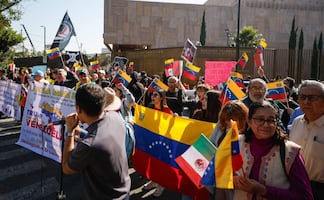Más Información

Captura de Maduro: Así es el USS Iwo Jima (LHD-7), el buque de asalto anfibio que traslada al líder venezolano a EU

EU captura a Nicolás Maduro: Así fue “Absolute Resolve”, la operación para detener al líder venezolano
Everything is ready for this weekend’s referendum on same-sex marriage in Romania , where the process has polarized public opinion and has become a test about the social trends splitting the member countries of the European Union .
Nestled in eastern Europe with a Latin and Christian orthodox heritage, Romania is a conservative country of 19 million inhabitants which decriminalized same-sex relations in 1996 , and whose Parliament banned all legislation against homosexuality only four years later.
It should be noted that the Constitution currently says marriage is “ between spouses .”
However, in 2016 religious, pro-family and right-wing organizations gathered over three million signatures demanding to amend the article 48 , in order to explicitly state that marriage is between a man and a woman .
Additionally, unmarried partners are not recognized by law.
“Family is based on the free marriage between a man and a woman , their equality and the parents’ right and duty to ensure the education and instruction of their children,” says the referendum proposal.
In July, the European Court of Justice in Luxembourg ruled in the case of a Romanian-American same-sex couple who wanted their marriage legally recognized in Romania .
The tribunal ruled that member countries “ may not obstruct the freedom of residence ” of EU citizens by refusing to grant residence for the same-sex spouse.
In this context, Romania’s Constitutional Court ruled on September 27 that gay couples had the same rights to a private and family life as heterosexuals and should “benefit from legal and juridical recognition of their rights and obligations.”
Theodora Ion-Rotaru
, spokeswoman of the gay rights group Accept , underscore the ruling was “extremely important”.
It says, she added, same-sex couples should have the same rights as heterosexuals: “the court says a same-sex family is worth as much as the heterosexual family .”
This Saturday and Sunday vote on the issue “is not against sexual minorities, as some are speculating. It is the result of a citizen’s petition ,” declared for its part Viorica Dancila, the Social Democratic Romanian Prime Minister.
Dancila also criticized the center-right opposition parties and NGOs calling to boycott the process, facing the risk of a low turnout—a minimum of 30% of registered voters ( 5.6 million ) is required for the referendum to be declared valid —the government decided to extend two days the popular consultation.
Rural support
According to observers, Dancila’s Social Democratic Party ( PSD ) is pushing the referendum in an effort to retain voters’ support, especially from rural areas, after a series of scandals—she called “ autistic ” the lawmakers who “ misinform the EU ” with regard to changes to the justice laws, for instance—, and a controversial reform of the system itself.
Elected in January, former European parliamentarian Dancila is the first female prime minister of Romania , yet she is also the third head of government in a year, reflecting the nation’s recent instability.
In Bucharest , the capital, political opponents say the real power behind Dancila is party leader and head of the Chamber of Deputies Liviu Dragnea , who has repeatedly clashed with President Klaus Iohannis and is trying to establish an authoritarian personal regime, akin to Hungary’s Viktor Orbán and Turkey’s Recep Tayyip Erdogan.
In July, Dragnea and Dancila succeeded in removing chief prosecutor Laura Codruta Kovesi . She and her National Anti-Corruption Directorate ( DNA ) have been instrumental in the last years and enjoyed the support of Brussels and the United States , albeit a WikiLeaks cable revealed that in 2006 then- FBI Director Robert Mueller —now heading the investigation into the allegedly Russian interference in the U.S. elections—urged Kovesi to step up wiretapping.
Once a “ local baron ” who began his career in the southern Muntenia region ( Wallachia ), Dragnea was subject of three criminal investigations by the DNA and according to the Brazilian press, he has been involved in money laundering in the South American country.
Emotions have been running high before the referendum and the Romanian Orthodox Patriarch Daniel called it “ a patriotic and profound democratic act ,” while the national broadcaster TVR1 apologized after a studio camera operator interrupted a live debate between a spokesman supporting the referendum and a gay rights activist, using “inappropriate language.”
International Amnesty
, the NGO European Commision on Sexual Orientation Law and the International League of Gay Associations stressed that the eventual constitutional change would encourage discrimination and homophobia.
In contrast with 11 western European partners ( Belgium , Denmark , France , Finland , Ireland , Luxembourg , the Netherlands , Portugal , Spain , Sweden , and the United Kingdom ), EU members Romania , Poland , Slovakia , Bulgaria , Lithuania , and Latvia do not recognize same-sex marriage or offer legal protection to same-sex couples.
Other European countries have approved civil unions with equal or similar rights as to marriage, without that name.
Editing by
More by
Noticias según tus intereses
[Publicidad]
[Publicidad]













